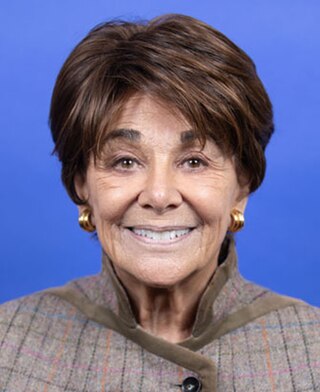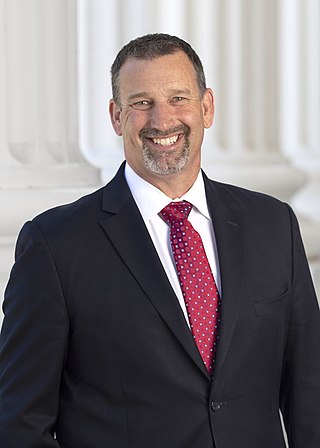
Anna A. Eshoo is an American politician serving as the U.S. representative from California's 16th congressional district. She is a member of the Democratic Party. The district, numbered as the 18th district from 2013 to 2023, is based in Silicon Valley, including the cities of Redwood City, Sunnyvale, Mountain View, and Palo Alto, as well as part of San Jose. Eshoo is the only Assyrian-American in Congress and the only Armenian American woman in Congress. On November 21, 2023, she announced she would not seek re-election in 2024.

The California State Legislature is a bicameral state legislature consisting of a lower house, the California State Assembly, with 80 members; and an upper house, the California State Senate, with 40 members. Both houses of the Legislature convene at the California State Capitol in Sacramento. The California state legislature is one of just ten full-time state legislatures in the United States. The houses are distinguished by the colors of the carpet and trim of each house. The Senate is distinguished by the color red and the Assembly by the color green, inspired by the United Kingdom's House of Lords and House of Commons respectively.

Network neutrality, often referred to as net neutrality, is the principle that Internet service providers (ISPs) must treat all Internet communications equally, offering users and online content providers consistent rates irrespective of content, website, platform, application, type of equipment, source address, destination address, or method of communication. Net neutrality was advocated for in the 1990s by the presidential administration of Bill Clinton in the United States. Clinton's signing of the Telecommunications Act of 1996, an amendment to the Communications Act of 1934, set a worldwide example for net neutrality laws and the regulation of ISPs.
The Communications Opportunity, Promotion and Enhancement (COPE) Act of 2006 was a bill in the U.S. House of Representatives. It was part of a major overhaul of the Telecommunications Act of 1996 being considered by the US Congress. The Act was sponsored by Commerce Committee Chairman Joe Barton (R-TX), Rep. Fred Upton (R-MI), Rep. Charles Pickering (R-MS) and Rep. Bobby Rush (D-IL).
In the United States, net neutrality—the principle that Internet service providers (ISPs) should make no distinctions between different kinds of content on the Internet, and to not discriminate based on such distinctions—has been an issue of contention between end-users and ISPs since the 1990s. With net neutrality, ISPs may not intentionally block, slow down, or charge different rates for specific online content. Without net neutrality, ISPs may prioritize certain types of traffic, meter others, or potentially block specific types of content, while charging consumers different rates for that content.

The Internet in the United States grew out of the ARPANET, a network sponsored by the Advanced Research Projects Agency of the U.S. Department of Defense during the 1960s. The Internet in the United States in turn provided the foundation for the worldwide Internet of today.
The California Online Privacy Protection Act of 2003 (CalOPPA), effective as of July 1, 2004 and amended in 2013, is the first state law in the United States requiring commercial websites on the World Wide Web and online services to include a privacy policy on their website. According to this California State Law, under the Business and Professions Code, Division 8 Special Business Regulations, Chapter 22 Internet Privacy Requirements, operators of commercial websites that collect Personally Identifiable Information (PII) from California's residents are required to conspicuously post and comply with a privacy policy that meets specific requirements. A website operator who fails to post their privacy policy within 30 days after being notified about noncompliance will be deemed in violation. PII includes information such as name, street address, email address, telephone number, date of birth, Social Security number, or other details about a person that could allow a consumer to be contacted physically or online.

The California Public Records Act was a law passed by the California State Legislature and signed by governor Ronald Reagan in 1968 requiring inspection or disclosure of governmental records to the public upon request, unless exempted by law.
The Telecoms Package was the review of the European Union Telecommunications Framework from 2007 – 2009. The objective of the review was to update the EU Telecoms Framework of 2002 and to create a common set of regulations for the telecoms industry across all 27 EU member states. The review consisted of a package of directives addressing the regulation of service provision, access, interconnection, users' contractual rights and users' privacy, as well as a regulation creating a new European regulatory body (BEREC).

Scott Wiener is an American politician and a member of the California State Senate. A Democrat, he represents the 11th Senatorial District, encompassing San Francisco and parts of San Mateo County.

Brian Maienschein is an American attorney and politician currently serving in the California State Assembly, representing the 76th district, encompassing parts of northeastern San Diego since 2012. Prior to serving in the state assembly, he was a member of the San Diego City Council, and the city's first Commissioner on Homelessness.

Brian Dwain Dahle is an American politician and farmer who has served as a member of the California State Senate from the 1st district since 2019. A member of the Republican Party, Dahle served as a member of the California State Assembly from the 1st district from 2012 to 2019, and as Assembly minority leader from 2017 to 2018. Before his election to the state legislature, Dahle served on the Lassen County Board of Supervisors from 1997 to 2012.

Lorena Sofia Gonzalez Fletcher is an American union leader and former politician. A Democrat, she served in the California State Assembly from 2013 to 2022, representing the 80th Assembly District, which encompasses southern San Diego. She was first elected to the Assembly in a 2013 special election to succeed Ben Hueso, who was elected to the State Senate in a special election.

Eduardo Garcia is an American politician who represents the 56th District in the California State Assembly, which includes cities and unincorporated communities in eastern Riverside County and Imperial County, including Blythe, Brawley, Bermuda Dunes, Calexico, Calipatria, Cathedral City, Coachella, Desert Hot Springs, El Centro, Heber, Holtville, Imperial, Indio, Mecca, Oasis, North Shore, Salton City, Thermal, Thousand Palms, and Westmorland.

Sydney Kai Kamlager-Dove is an American politician serving as the U.S. representative for California's 37th congressional district since 2023. A Democrat, she previously served in the California State Senate, representing the 30th district. She has also served in the California State Assembly and as a trustee for the Los Angeles Community College District.

United States Telecom Association v. FCC, 825 F. 3d 674, was a case at the U.S. Court of Appeals for the D.C. Circuit upholding an action by the Federal Communications Commission (FCC) the previous year in which broadband Internet was reclassified as a "telecommunications service" under the Communications Act of 1934, after which Internet service providers (ISPs) were required to follow common carrier regulations.
Arguments associated with net neutrality regulations in the US came into prominence in mid-2002, offered by the "High Tech Broadband Coalition", a group comprising the Business Software Alliance; the Consumer Electronics Association; the Information Technology Industry Council; the National Association of Manufacturers; the Semiconductor Industry Association; and the Telecommunications Industry Association, some of which were developers for Amazon.com, Google, and Microsoft. The full concept of "net neutrality" was developed by regulators and legal academics, most prominently law professors Tim Wu, Lawrence Lessig and Federal Communications Commission Chairman Michael Powell often while speaking at the University of Colorado School of Law Annual Digital Broadband Migration conference or writing in the Journal of Telecommunications and High Technology Law.

Arnold Schwarzenegger was an early opponent of same-sex marriage in the United States, including during his Governorship of California. As an elected official he opposed legal recognition of same-sex marriage but otherwise he supported LGBT rights legislation, including civil unions.
Net neutrality is the principle that governments should mandate Internet service providers to treat all data on the Internet the same, and not discriminate or charge differently by user, content, website, platform, application, type of attached equipment, or method of communication. For instance, under these principles, internet service providers are unable to intentionally block, slow down or charge money for specific websites and online content.
The California Internet Consumer Protection and Net Neutrality Act of 2018 is a law in California designed to protect net neutrality. It was signed into law on September 30, 2018.














